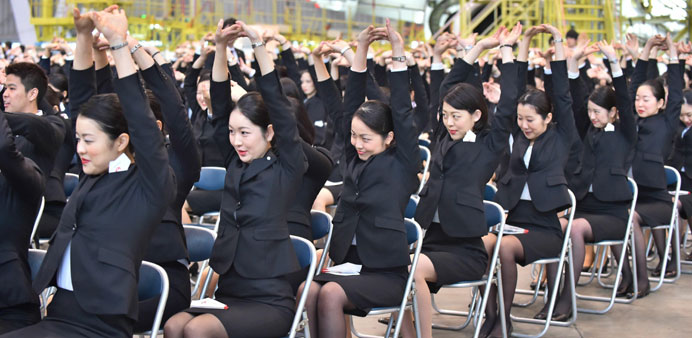AFP/Tokyo
With crisp new suits and fresh haircuts, thousands of Japanese twenty-somethings started their first day on the job yesterday in an annual ritual that traces back to the country’s fast-disappearing jobs-for-life work culture.
At Japan Airlines, more than 1,000 first-day employees tossed folded paper planes at a ceremony inside a giant hangar.
The bosses at shoe cream maker Columbus buffed new hires’ shoes, a reminder they’ll have to live up to its motto: “A little sparkle makes a big difference.”
An executive at an aquarium north of Tokyo welcomed one of the venue’s new hires in an underwater ceremony — both wearing scuba-gear over their suits — which the neophyte later described as “a really valuable experience”.
April 1 is the start of Japan’s fiscal year, a day when tens of thousands of new recruits — some awkwardly struggling to get comfortable in formal attire — fan out across Tokyo and other major cities to report for their first day of work.
Missing the big day, known as “shinsotsu ikkatsu saiyo” in Japanese, can hurt procrastinators who often struggle to find jobs after leaving school — companies visit campuses to get their hands on cream-of-the-crop students before they finish their studies.
Over at the Bank of Japan, governor Haruhiko Kuroda sternly informed about 140 aspiring central bankers what was expected of them.
“As central bank employees, you must have a sense of mission,” he said.
Meanwhile, the chairman of troubled Skymark Airlines thanked 11 new hires for actually turning up to work at the now-bankrupt — but still operating — carrier.
“We appreciate you very much for choosing Skymark at this difficult time,” Takashi Ide said.
About 90% of new university and high school graduates start jobs at a time which was traditionally seen as the beginning of the lifetime employment that defined Japan’s post-war rise.
The popular image is one of selfless employees devoting themselves to the company, working punishing hours as they toil for Japan’s future and accepting they will be molded into the firm’s corporate culture.
But those attitudes are changing as the economy struggles and firms offer more contract and part-time work, giving young employees fewer benefits and little incentive to devote their life to the company.
Critics have blamed Japan’s notoriously rigid workplaces for stifling innovation and creativity in an increasingly competitive global market.
“These kids all ate from the same bowl for decades. They fed on the culture and ended their careers the same way,” said Takeshi Natsuno, a former executive at mobile giant NTT Docomo who now teaches at top-rated Keio University.
“Their field of vision was too narrow.”

New employees of Japan Airlines Group stretch prior to their entrance ceremony at a hangar in Tokyo.
